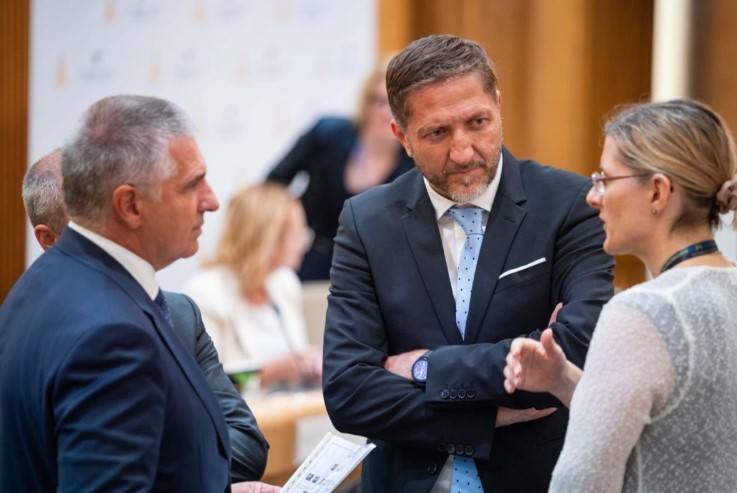After Prime Minister Robert Golob announced a 0.2% statutory tax on banks’ balance sheets, saying it was the only way to help with flood recovery, the Minister of Finance has now announced “forced aid” for others, too. So, what is coming? The final showdown with capitalism and businesses?
Prime Minister Robert Golob believes that the right solution to enable banks to help in the flood recovery is new taxation, despite other options that would be much more favourable for all stakeholders. Given that the Golob government has already created impossible conditions for the economy to function well, it is not surprising that Finance Minister Klemen Boštjančič has now declared “war” on others, too. The banks were just the first on their list.
“Banks should not and cannot be the only ones to bear a share of the reconstruction burden,” the Finance Minister told the media. We should mention here that it is already known that all companies and citizens will have to contribute to the budget through solidarity Saturdays or contributions. So, the government is not done with taxation yet, and an “attack” on others is clearly about to follow. When asked whether the energy sector, for example, would also be taxed, Boštjančič said that the government had various measures at its disposal and that, due to the specific ownership structure, surplus profits were collected in a different way there, presumably targeting the payment of profits in the form of dividends.
The government is already “carrying out analyses to determine whether additional contributions are needed”
In any case, the issue of the contributions from companies to the flood reconstruction fund is not yet closed, at least when it comes to banks, as the Minister told the media outlet N1 that “they are already carrying out analyses to determine whether additional contributions are needed, but if this happens, it will be through dialogue with the economic sector,” the Minister said. It should be noted that the government’s actions so far have not created favourable conditions for the economy and entrepreneurship, a fact that was also emphasised by university professor Boštjan M. Turk, who said recently: “No natural catastrophe can come close to the kind of damage that the Golob government is doing to Slovenia by creating conditions that are absolutely not favourable for the development of what our society needs the most – free entrepreneurial initiative and free enterprise.”
They want to tax the banks, even though there are other options
The legal taxation of banks announced by the Prime Minister will be regulated in the so-called Recovery Act, which will address systemic measures to deal with the consequences of the biggest natural disaster in Slovenia’s history. It is expected to be adopted next month. The tax on the balance sheet is intended to raise 100 million euros a year, or half a billion euros over five years. Minister Boštjančič tried to explain the government’s intentions by saying that “they understand that the banking sector is reluctant when it comes to new tax burdens,” but that the government wants others to contribute to the recovery, too. This is a rather shameless statement from the Minister, given that in July 2022, immediately after the operational start of the Robert Golob government, NGOs started to receive more and more taxpayers’ money. European funds were also channelled into them. In one year, they received as much as 40 million euros more. This money would certainly have come in handy in this situation, but the government is ignoring this fact.
The government is ignoring the Fiscal Council’s warnings
The Minister did not say much about the new taxation of banks, as more will be known when the draft law is written, but he confirmed to one of the main media outlets that the voluntary contributions already paid by banks to the SOS fund or the contributions paid by banks to the SOS fund under the Solidarity Work Saturdays or the solidarity contribution will be taken into account in the assessment of the tax. The Fiscal Council has repeatedly warned the government about unrealistic rebalances as well as budget transfers with new taxes, but Boštjančič disagrees. Taxes are supposed to be a “marginal” source, as the plan is still to finance the recovery through the budget and borrowing. Boštjančič said that “They already know that the impact of the crisis on public finances will be greater than that of the Covid-19 crisis.”
T. B.


